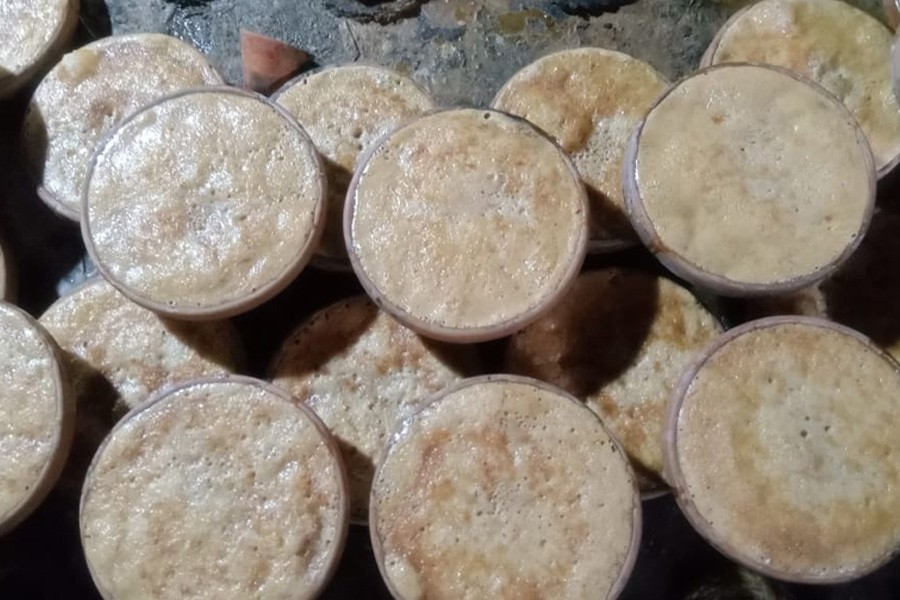GI tag drives growth of Bogura yogurt industry
Annual sales go beyond Tk 14 billion

Published :
Updated :

Bogura, long hailed as the yogurt capital of Bangladesh, is experiencing a remarkable surge in demand for its famed dairy delicacy, with annual sales now exceeding Tk 14 billion.
The transformation follows the Geographical Indication (GI) certification of Bogura's yogurt, which has elevated its profile both nationally and internationally. The GI certification was announced in June 2023.
The GI recognition has significantly boosted Bogura yogurt's demand, increasing annual turnover by at least 40 per cent, according to local producers.
Traditionally crafted using methods passed down through generations, Bogura's yogurt - locally known as 'Bogurar doi' - is primarily produced in Sherpur upazila, about 160 kilometres away from Dhaka and 24 kilometres off Bogura town.
The area, which nestles along the Jamuna River, has long been acclaimed for the distinctive taste and texture of its yogurt, which locals attribute to the region's water and the specific grasses consumed by dairy cows.
"The current market size of Bogura yogurt is estimated at over Tk14 billion," said Md Nurul Huda Tilok, director of Asia Sweets, a leading producer of the yogurt.
Mr Tilok, also a director at the Bogura Chamber of Commerce and Industry (BCCI), said: "Our daily turnover exceeds Tk40 million, and demand is growing every day."
He noted that yogurt from Bogura is now widely sold beyond the district, with large volumes going to adjacent regions and even hotels along the Dhaka-Rangpur highway.
"Many Dhaka-based outlets also source directly from us," he added.
Hasen Ali Alal, chairman of Akboria Limited - one of the oldest and most reputable yogurt brands in Bogura - said: "Since the GI certification, demand has surged dramatically, not just from across Bangladesh, but also from the Middle East, Europe, and North America."
He mentioned that around 500 yogurt outlets are currently operating in the district.
"Once we shipped nearly 40,000 earthen pots filled with yogurt to North America," Mr Alal noted.
However, exporting yogurt remains a logistical and technical challenge.
As general secretary of the Bogura Restaurant Owners' Association, Mr. Alal identified two key issues: preserving yogurt quality during long-distance shipping and the complexity of export regulations.
"We need investment in preservation technology to maintain quality during transit," he said.
"Government-private collaboration is essential, especially to simplify export procedures," he added.
Sairul Islam, president of the Bogura Chamber of Commerce and Industry (BCCI), echoed those concerns.
Domestic demand has skyrocketed, but exports are still far from reaching their potential," he said.
"The biggest issue is preservation - how do we keep yogurt fresh for several weeks?"
He also emphasised the need for better connectivity with Dhaka's airport.
"Due to traffic congestion, it often takes several hours to transport goods. We badly need a functional airport in Bogura," he commened.
Mr. Islam proposed the establishment of a dedicated small export processing zone (EPZ) in the region for yogurt, sweets, and related goods.
Government officials confirmed to The Financial Express that steps are underway to revive Bogura's small airstrip, currently used by the military.
"We expect civil aviation services to be launched by January," said Hosna Afroja, the deputy commissioner of Bogura.
"Once operational, we will be able to export yogurt using air-conditioned logistics," he hoped.
The yogurt industry has also catalysed a range of ancillary businesses - from pot-making to rope production using dried paddy leaves - generating jobs and boosting the local economy.
According to the Bogura District Livestock Office, around 100,000 people are involved in producing raw materials linked to yogurt manufacturing
District Livestock Officer Md Anisur Rahman told The Financial Express that more than 1.9 million litres of milk are produced a day across Bogura's 12 upazilas, with most of it used in yogurt production.
"Yogurt making began in Sherpur but now extends over the entire district," Rahman said.
"Milk is purchased from farmers at rates between Tk55 and Tk60 per litre." Bogura's yogurt heritage dates back nearly 150 years.
Oral history credits the beginnings to two legendary figures from Sherpur - Getu Ghosh and Nilkantha Ghosh.
Locals recount stories of Bogura yogurt being served at Nawab houses and even being taken to England in 1938 by then British Governor Sir John Anderson.
Though undocumented, the tale lives on in local memory.
Former Pakistani Prime Minister Mohammad Ali is also said to have praised Bogura yogurt in a session of Pakistan's National Assembly, according to elderly residents.
Today, famous brands like Asia Sweets, Doighar, Akboria Grand Hotel, Shaymoli Hotel, Rofat Doighar, Mohorom Ali Doi, Gouro Gopaler Doi, Chinipata Doi, Sherpur Doi, Food Village, Soudia, Jolojog, and Shompa Dodhi Bhander continue the tradition.
As the yogurt of Bogura evolves from a local delicacy to a global product, balancing tradition with modern innovation will be key to preserving its identity while unlocking its full economic potential.


 For all latest news, follow The Financial Express Google News channel.
For all latest news, follow The Financial Express Google News channel.